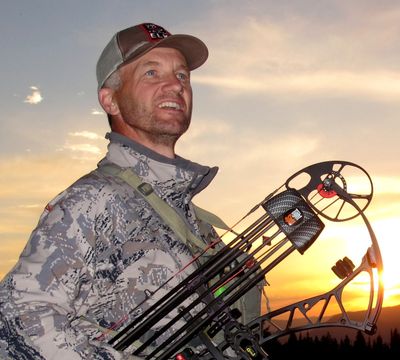TV host: Hunting effort key to satisfaction

In the world of TV sportsman shows, at least one star is trying to avoid skewing the reality of hunting and fishing.
“I try to paint the real image of public land hunting on my show,” said Randy Newberg of Bozeman, TV host and producer of Fresh Tracks and On Your Own Adventures on the Sportsman Channel.
He points out that public land is essential; that success isn’t guaranteed, and that the value of the experience is commensurate with the effort expended.
The Backcountry Hunters & Anglers Rendezvous in Spokane this week will feature Newberg in a Saturday keynote address.
Newberg, 50, is an insightful advocate for self-guided public-land hunters and protection for public lands.
“I often wonder why hunters and anglers see the world differently (than nonsportsmen),” he said. “I think it’s because we participate rather than being spectators.”
The effort a hunter puts into getting into wild places boosts his appreciation, he suggests.
“But even within the ranks of hunters there are those who see rock and glaciers and say, ‘What good is that?’ If you don’t participate in that kind of hunting, your understanding and values are different than those who do.”
Newberg contends that all sportsmen should be advocates for preserving the backcountry experience. Formidable terrain is nature’s way of preserving wild species, he said.
Wildlife managers can offer longer and more liberal seasons in areas where everybody and his dog cannot easily reach in the family pickup.
“Backcountry is big and less exploited; pressure is spread out over a larger area,” he said.
“It’s not by accident that Montana has six weeks of archery seasons and five weeks of rifle hunting. It’s because there’s a lot of openness, and a lot of backcountry.”
Men and women who hunt the backcountry don’t tend to congregate toward clubs or groups, he said. “It’s their inherent nature to be under the radar. They’d rather be out doing things.
“A lot of very wild places are outside of wilderness areas,” he said, hinting at the secret to finding some of his favorite sweet spots. “Those are the cool places that attract me. Some might be only a few square miles in size, but the topography keeps most people from getting there.
“The appeal isn’t necessarily that we put a tag on something. It’s the total package. Getting turned around momentarily in big country can add to it. Backcountry provides something special and unique for those who desire it.”
Newberg says biologists have told him the best population diversity from older to younger animals usually occurs in backcountry areas where animals find security.
“In 1993, Montana Fish Wildlife and Parks held open house meetings to address the increasing penetration into the backcountry with motorized vehicles,” he said. “Officials pointed out that more vehicle access would result in restrictions in hunting seasons in order to maintain big-game levels. They said, ‘If that’s what you want, we can manage for it.’
“The majority of hunters, including me, said they wanted the longer seasons. If that means we have to use horses or pack meat out on our backs, sign us up. State officials took note.”
Newberg contends there’s something completely different between shooting a mule deer on the Rocky Mountain front versus bagging one in a 500-acre pasture.
“In the backcountry you feel a little more aware everything, a little more dialed-in to the danger of the terrain. You think more about the grizzly bears.
“Some hunters leave our modern comforts of home to seek something a little more personal in a quiet and challenging experience. Backcountry provides all of that in spades.”